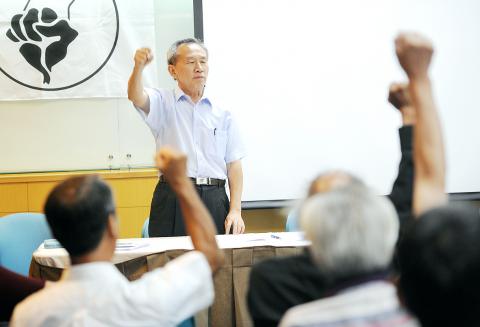The Taiwanese National Party (TNP) yesterday announced its formation in Taipei, becoming the only political party in the nation to list a referendum on self-determination and the creation of a new country as its objectives.
Huang Hua (黃華), who served four jail terms for a total of 23 years for his involvement in Taiwan’s independence movement during the Martial Law era, was voted chairman of the party. Huang served as an adviser to former president Chen Shui-bian (陳水扁).
“No one will give you an independent country as a gift. You have to earn it and that’s why we are establishing this party today,” Huang said.

Photo: Lo Pei-der, Taipei Times
About 100 independence supporters, most of them seniors, have registered as the party’s founding members. Among them, more than a dozen are retired or active university professors who used to be actively associated with the Taiwan Independence Party, otherwise known as the Taiwan Nation Party, which has lost momentum in recent years.
The party chose its founding day to remember the Taiwanese People’s Party, the first political party established by Taiwanese on July 10, 1927, during the Japanese colonial era.
The new party aims to promote Taiwanese nationalism by what it called the “Taiwan nationalism movement 2.0,” with the ultimate goal of “expelling the Chinese and safeguarding Taiwan” and the mid-term goal of holding a national referendum under international observance on Feb. 28, 2014, to determine Taiwan’s independence.
“Chinese” were defined by the party as “people who were born in or have lived in Taiwan for an extended period, but who identify [themselves] as Chinese,” Ted Lau (劉重義), mastermind of the party’s political philosophy, said in a keynote speech.
The first phase of the Taiwan nationalism movement ended last year in failure, Liu said, adding that a brand new “2.0” era would consist of actions as well as promotion and mobilization through the Internet and social media.
The TNP intends to duplicate the experience of Estonia, a former Soviet Republic that declared independence in 1991, by enlisting Taiwanese who favor the establishment of a new country, before holding a national referendum.
Liu said the party also tried to pattern itself after the Sinn Fein, a political party in Northern Ireland that supports the establishment of a new Irish Republic, and functions as part of a trinity organization, with the Taiwanese National Congress and the Taiwan Guardian Team making up the other two organizations.
“However, I think Taiwan has a mature society and mechanism, so the Taiwan Guardian Team will not be a military organization like the Irish Republican Army. It will be a grassroots organization that works for local communities instead,” Liu said.
“The road to Taiwan independence has been and will be a long and winding road,” political commentator Paul Lin (林保華), a Chinese who obtained Republic of China citizenship, said before giving the TNP his blessing.
The TNP said it would endorse Democratic Progressive Party Chairperson and presidential candidate Tsai Ing-wen (蔡英文) in the presidential election in January, adding that it planned to nominate candidates for the legislative election.

A strong continental cold air mass is to bring pollutants to Taiwan from tomorrow, the Ministry of Environment said today, as it issued an “orange” air quality alert for most of the country. All of Taiwan except for Hualien and Taitung counties is to be under an “orange” air quality alert tomorrow, indicating air quality that is unhealthy for sensitive groups. In China, areas from Shandong to Shanghai have been enveloped in haze since Saturday, the ministry said in a news release. Yesterday, hourly concentrations of PM2.5 in these areas ranged from 65 to 160 micrograms per cubic meter (mg/m³), and pollutants were

Taiwan’s armed forces have established response protocols for a wide range of sudden contingencies, including the “Wan Chun Plan” to protect the head of state, the Ministry of Defense (MND) said today. After US President Donald Trump on Saturday launched a series of airstrikes in Venezuela and kidnapped Venezuelan President Nicolas Maduro, concerns have been raised as to whether China would launch a similar “decapitation strike” on Taiwan. The armed forces regularly coordinate with relevant agencies and practice drills to ensure preparedness for a wide range of scenarios, Vice Minister of National Defense Hsu Szu-chien (徐斯儉) told reporters before a

EVA Airways on Saturday said that it had suspended a pilot and opened an investigation after he allegedly lost his temper and punched the first officer several times as their plane was taxiing before takeoff at Los Angeles International Airport. According to a report published on Thursday by The Reporter, the incident occurred after the flight’s Malaysian first officer tried to warn the Taiwanese pilot, surnamed Wen (文), that he was taxiing faster than the speed limit of 30 knots (55.6kph). After alerting the pilot several times without response, the first officer manually applied the brakes in accordance with standard operating

NOT AN OPENING: Trump’s violation of international law does not affect China’s consideration in attacking Taiwan; Beijing lacks capability, not precedent, an official said Taiwanese officials see the US’ capture of the president of Venezuela as a powerful deterrent to Beijing’s aggression and a timely reminder of the US’ ability to defeat militaries equipped with Chinese-made weapons. The strikes that toppled Venezuelan President Nicolas Maduro signaled to authoritarian leaders, including Chinese President Xi Jinping (習近平), US President Donald Trump’s willingness to use military might for international affairs core to US interests, one senior official in Taipei’s security circle said. That reassured Taiwan, the person said. Taipei has also dismissed the idea that Trump’s apparent violation of international law could embolden Beijing, said the official, who was not